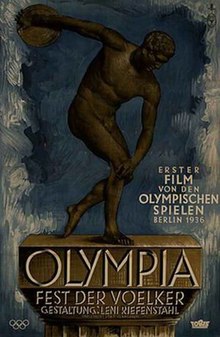| Olympia | |
|---|---|
 Part 1 poster | |
| Directed by | Leni Riefenstahl |
| Written by | Leni Riefenstahl |
| Produced by | Leni Riefenstahl |
| Cinematography | Paul Holzki |
| Edited by | Leni Riefenstahl |
| Music by | |
Production company | Olympia-Film |
| Distributed by | Tobis |
Release date |
|
Running time | 226 minutes |
| Country | Germany |
| Language | German |
| Budget | 2.35 million ℛ︁ℳ︁ |
| Part of a series on |
Olympia is a 1938 German documentary film written, directed and produced by Leni Riefenstahl, which documented the 1936 Summer Olympics, held in the Olympic Stadium in Berlin during the Nazi period. The film was released in two parts: Olympia 1. Teil — Fest der Völker (Festival of Nations) (126 minutes) and Olympia 2. Teil — Fest der Schönheit (Festival of Beauty) (100 minutes). The 1936 Summer Olympics torch relay, as devised for the Games by the secretary general of the Organizing Committee, Dr. Carl Diem, is shown in the film.
Olympia is controversial due to its political context and propaganda value. However, the techniques Riefenstahl employed are almost universally admired and had a lasting influence on film and television coverage of sport events. Olympia appears on many lists of the greatest films of all time, including Time magazine's "All-Time 100 Movies".[1]